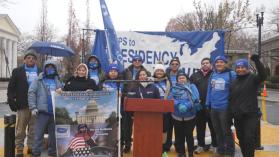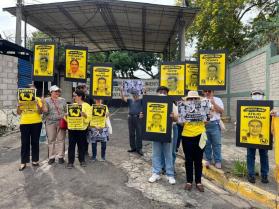Survivors Call for Truth and Reparation at XI International Restorative Justice Tribunal in San Salvador
This past week, the Institute for Human Rights at the University of Central America in El Salvador held its eleventh annual International Restorative Justice Tribunal. Each year, the tribunal reviews cases of human rights violations that occurred during the Salvadoran civil war. The initiative began in 2009—on the 20th anniversary of the Jesuit massacre at the UCA—as a space for survivors to bear witness, give testimony, seek truth, demand justice, and call for reparations for grave human rights violations in the presence of international lawyers and judges. This year, the tribunal focused on five cases of violent repression committed against the Salvadoran student movement.
The annual tribunals take place in various locations year to year—sometimes at the same sites at which massacres occurred. Their restorative power lies in the fact that survivors speak from positions of authority alongside judges, public officials, and others and are able to "verbalize their memories, to condemn those responsible, and to build a narrative that uncovers the story of a town and of a country that has preferred to hide and forget their past."
The tribunals are likewise a time of analysis. In last week's sessions, speakers addressed the role of the United States in both extending the Salvadoran civil war and concealing its abuses. At the height of the war, the US was sending more than a million dollars a day to the repressive Salvadoran state, despite constant pleas for the aid to stop, including from Monseñor Oscar Romero, while also training Salvadoran soldiers in techniques of killing and torture. These techniques were later used to carry out some of the war's most brutal massacres.
Notably, a prominent figure from the war period—Trump's new Special Envoy to Venezuela, Elliot Abrams—is complicit in some of those massacres and countless other abuses. Salvadoran human rights defenders and scholars are also decrying Trump's nomination of Ronald Johnson, former military colonel and currently a CIA liaison to the U.S. Armed Forces Southern Command for Central and South America, for U.S. Ambassador to El Salvador.
At the Restorative Justice Tribunals, survivors and their advocates demand reparation that includes investigation of human rights abuses, integration of the history of those abuses into the national educational curriculum, complete and public disclosure of the truth, continued search for the disappeared, identification of remains, and restitution in accordance with UN resolutions. The objectives, renewed each year, are to create a measure of healing, collectively restore historical memory, and ultimately to produce a society transformed by the process.

 "I am a CISPES supporter because continuing to fight for social justice and a more people-centered country means continuing the dream and sacrifice of thousands of my fellow Salvadorans who died for that vision.” - Padre Carlos, New York City
"I am a CISPES supporter because continuing to fight for social justice and a more people-centered country means continuing the dream and sacrifice of thousands of my fellow Salvadorans who died for that vision.” - Padre Carlos, New York City

